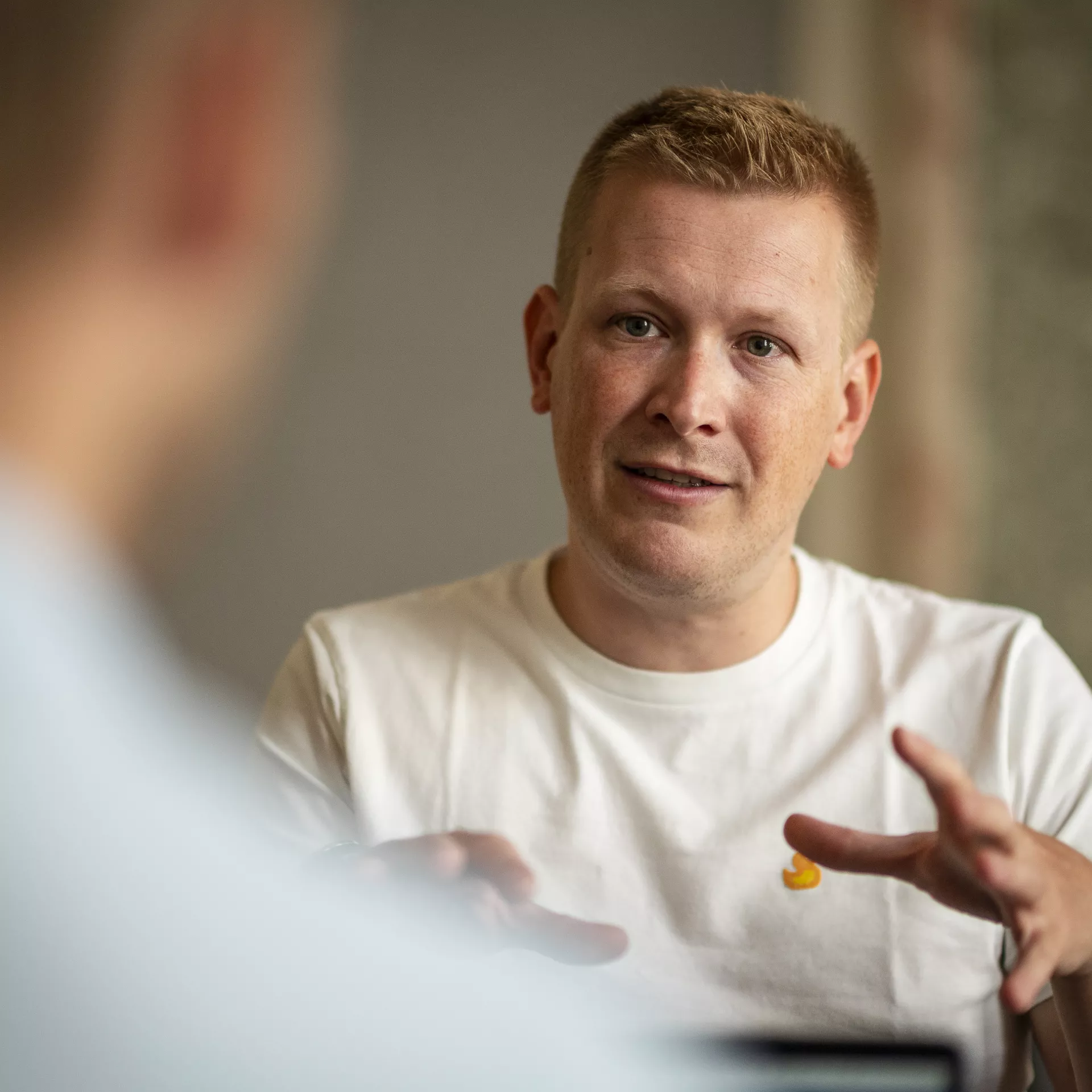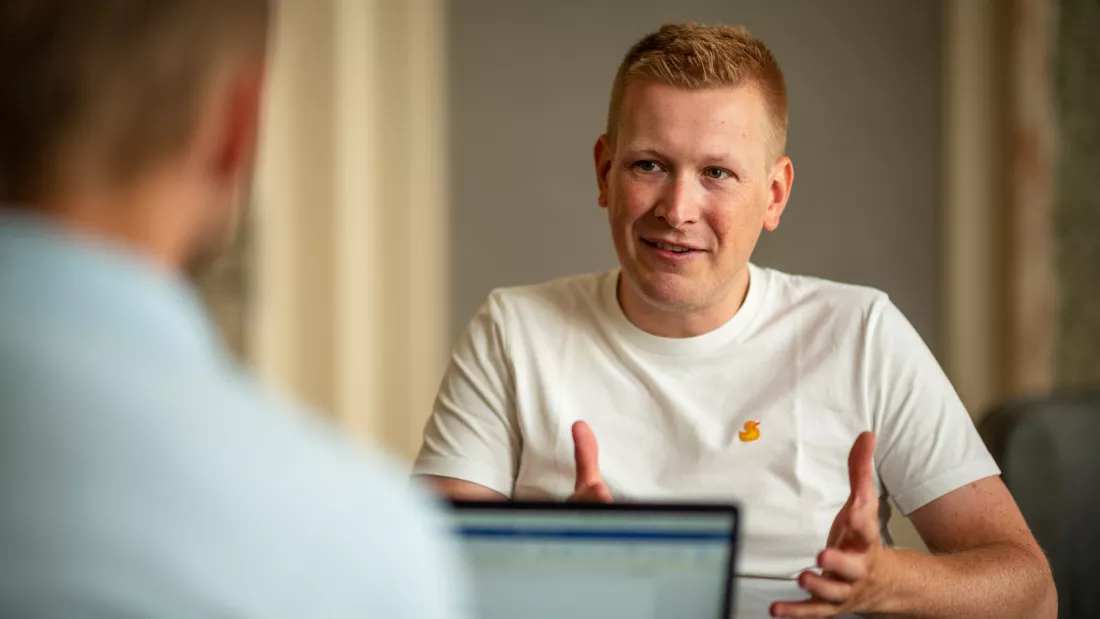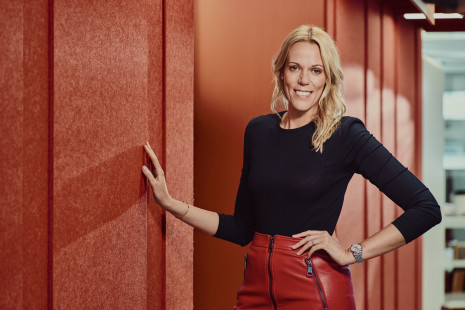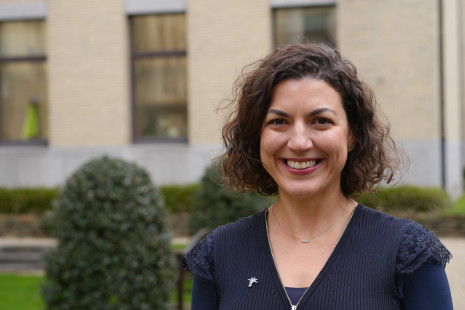Sander Wuyts
CEO ImmuneWatch
Our innovation? We're making the development of vaccines and immunotherapies a lot faster and more cost-efficient.
© Sander Wuyts - copyright Jonathan Ramael

ImmuneWatch innovately assists pharma and biotech companies with the development of vaccines and cancer therapies
While the Antwerp health hub Dunden is still slumbering, Sander Wuyts, CEO of ImmuneWatch, has already completed a 35-kilometre bike ride. He works on groundbreaking innovations in the health sector, dedicating one day a week to working at Dunden. What's on his agenda today? An interview about the fascinating journey that ImmuneWatch has undergone over the past few years. The coffee is ready, photographer Jonathan is pleased with the incoming daylight, so we're all set to begin.
Hi Sander, can you tell us how ImmuneWatch came about?
“ImmuneWatch started with my colleague Benson, an immunologist who faced a problem: although he and his colleagues could obtain comprehensive data about an immune system, they lacked the knowledge to decipher that data. My other colleagues, Kris and Pieter—experts in bio-data mining—joined the effort, and together, they conducted research for about six years. I became involved when it became clear there was potential to commercialize and further develop this knowledge as a spin-off. They were looking for someone with an entrepreneurial spirit and a strong scientific background, which is exactly what I brought. I am passionate about translating academic knowledge into practical applications.”
Can you briefly explain what you do?
“We assist pharma and biotech companies in developing their vaccines and cancer therapies. Our solution helps companies determine how well their vaccine or therapy works. Additionally, we support them in the development process by advising them on which components to include in their vaccine or therapy. We achieve this by analyzing biological data with our algorithms. What is the advantage of our solution? We make the development of vaccines and therapies significantly faster and more cost-efficient.”
You received financial support from the city. What did you use it for?
“We knew that our solution had significant potential. Naively, we thought we could immediately start selling to companies. Although there was initial interest, we were told they wanted to wait a bit longer. With the city's support, we researched what the market needed and were able to develop the technology further based on those needs. This was a major boost for our business development. Additionally, we developed our 'Design' platform. This innovative platform can predict whether a vaccine or therapy will be effective, allowing us to address a larger market now.”

Where do you stand now?
“The city's support has paid off: 2024 has been a successful commercial year for us. We've secured our first clients, primarily from the American biotech sector. The market seems a bit cautious in Belgium, where there are mostly larger pharmaceutical companies, but we hope this will change soon as we can show more of a track record. Currently, we are analyzing how those initial successes came about so that we can apply those lessons and continue to innovate.”
How do you ensure that your products reach the right target audience?
“I strongly believe in collaboration. We handle the data analysis, but other specialized companies do the data collection. We aim to approach our clients together with these partners. Our ultimate goal is for our solution to become a standard component of the development workflow for vaccines and therapies.”
You are based in Dunden, Antwerp's health hub. Why did you choose this location?
“It's a fantastic place to engage with colleagues who are also involved in AI, machine learning, or health tech in general. Here, we can exchange ideas and gain new insights. The presence of strong academic partners such as the University of Antwerp, Antwerp University Hospital, the Institute of Tropical Medicine, and Vaccinopolis is also crucial. Belgium is a true hotspot for clinical studies, including vaccine studies, and Antwerp plays a significant role in this. We often speak with international clients who say, 'Oh, we’ve conducted a clinical study in Antwerp before!' So Antwerp serves as a quality label in our discussions.'”
How do you see the future of ImmuneWatch?
“We aim to develop straightforward software that contributes to both cancer and vaccine research and, in the future, to autoimmune diseases. The field of cancer therapies, in particular, remains largely untapped. I’m proud that we are making technology originally used by university scientists accessible to a broader audience. It’s gratifying to develop something that can help so many people. Now, we need to continue delivering on that promise.”
Are you afraid of competition?
“We are an early player in the market, so there isn't much direct competition yet. This has its advantages, but it also means we need to convince many potential customers and investors of the strength of our innovation. That process has been getting easier and easier in recent months. Our major advantage is that we have been refining our algorithm for years and are technologically ahead of newcomers. At the end of last year, we were the top performers in a machine learning competition. Additionally, we now understand what our customers need, which also gives us an edge.”
How important is it to keep innovating?
“Evolution and innovation are essential. We must keep learning and continuously improve our algorithm to capture the entire market. The key point is that we’re not doing this alone; we’re doing it with our clients as they bring the vaccines and therapies to market. The support from the city has played a crucial role in this.”
Thank you, Sander, for your time, and we wish you continued success.
Autumn 2024: New call to innovate in digital, circular or health
In autumn 2024, the city will launch a new call for digital, circular or health innovations. We will keep you updated on LinkedIn.
See which projects have already received funding to kick-start their innovation.


